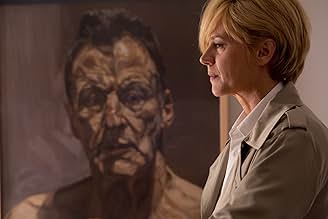VALUTAZIONE IMDb
7,1/10
34.833
LA TUA VALUTAZIONE
Dopo un incontro casuale, una donna dal cuore spezzato decide di affrontare la sua vita e gli eventi più importanti che riguardano la figlia.Dopo un incontro casuale, una donna dal cuore spezzato decide di affrontare la sua vita e gli eventi più importanti che riguardano la figlia.Dopo un incontro casuale, una donna dal cuore spezzato decide di affrontare la sua vita e gli eventi più importanti che riguardano la figlia.
- Nominato ai 1 BAFTA Award
- 14 vittorie e 62 candidature totali
Darío Grandinetti
- Lorenzo
- (as Dario Grandinetti)
Ramón Agirre
- Inocencio - portero
- (as Ramón Aguirre)
Recensioni in evidenza
My interest in Almodovar is rather muted. He doesn't excel in any of the ways of presenting the world that really matter to me but he does several things more than well, so every so often I visit. There is the desire to submerge ourselves in fiction, lose ourselves to self in order to wake to a fabric that extends from self. That's Talk to Her for me.
But like Woody Allen or the Coens, he has consistently worked for so long on the same motifs that coming to him is also a matter of is he particularly inspired that day. I'm pleased to say he is.
In the individual pieces of cinematic craft, this is not particularly exceptional. If you're heavily inclined to how story resolves drama, you will see here something that simply trails off near the end. The symbolic motifs greet us upfront; a deer in slow-motion, tumultuous sea out the window. His bright reds on walls and the like are not something I can get excited about, in this or any film.
But he is inspired today on the fundamental matter of self passing through self. He manages to do this with just a few strands of narrative. There is the young woman who was on her way to all life ahead of her that night on the train, who finds herself yanked by unexpected passion. There is the house of passion in the small fishing village, eerily explored with Hitchcock hues. And there is bewildering loss as she wanders away a widowed mother.
Above all I love here the sense of transition. Almodovar does so well - his actress helps - in spinning narrative to explore tragedy. He says enough about the jittery urge for adventure as a story we throw ourselves in so that we can infer more fleeting illusion around the crushing melodrama about life breaking down. She's not just this grieving woman that another film, say, in the realist format would have simply followed around Madrid; we're privy to all this richness of her young self having set off in search. Things couldn't have only worked this way for her, it's important to see; but sometimes they do, sometimes setting out for open sea means finding yourself marooned on an island, nothing right or wrong.
And Almodovar is ineluctably Spanish, meaning Catholic; so communion with the fleeting, transcendent stuff must take place firmly within ritual, in his case (just like Ruiz before) fiction. The whole is narrated by an author writing the story down as she waits in her apartment, shifting us forward and back. It speaks about the imaginative mind being burdened by the narratives of memory. For Almodovar, there is merit in the effort. Had she not stayed behind to write, she would have missed the letter. Even more pertinently for me, there is a bedridden mother (a mirrored woman) who is allowed to languish in her room, written off as an invalid. But when her daughter comes to visit, the recognition nourishes her back to her feet.
But like Woody Allen or the Coens, he has consistently worked for so long on the same motifs that coming to him is also a matter of is he particularly inspired that day. I'm pleased to say he is.
In the individual pieces of cinematic craft, this is not particularly exceptional. If you're heavily inclined to how story resolves drama, you will see here something that simply trails off near the end. The symbolic motifs greet us upfront; a deer in slow-motion, tumultuous sea out the window. His bright reds on walls and the like are not something I can get excited about, in this or any film.
But he is inspired today on the fundamental matter of self passing through self. He manages to do this with just a few strands of narrative. There is the young woman who was on her way to all life ahead of her that night on the train, who finds herself yanked by unexpected passion. There is the house of passion in the small fishing village, eerily explored with Hitchcock hues. And there is bewildering loss as she wanders away a widowed mother.
Above all I love here the sense of transition. Almodovar does so well - his actress helps - in spinning narrative to explore tragedy. He says enough about the jittery urge for adventure as a story we throw ourselves in so that we can infer more fleeting illusion around the crushing melodrama about life breaking down. She's not just this grieving woman that another film, say, in the realist format would have simply followed around Madrid; we're privy to all this richness of her young self having set off in search. Things couldn't have only worked this way for her, it's important to see; but sometimes they do, sometimes setting out for open sea means finding yourself marooned on an island, nothing right or wrong.
And Almodovar is ineluctably Spanish, meaning Catholic; so communion with the fleeting, transcendent stuff must take place firmly within ritual, in his case (just like Ruiz before) fiction. The whole is narrated by an author writing the story down as she waits in her apartment, shifting us forward and back. It speaks about the imaginative mind being burdened by the narratives of memory. For Almodovar, there is merit in the effort. Had she not stayed behind to write, she would have missed the letter. Even more pertinently for me, there is a bedridden mother (a mirrored woman) who is allowed to languish in her room, written off as an invalid. But when her daughter comes to visit, the recognition nourishes her back to her feet.
You may enjoy Julieta (2016) more if you know that it is a women's film from the melodrama genre and a story of pure emotion. While it is labelled a romance it is nothing like a romance and don't expect light entertainment or laughs as the film is devoid of humour. What is does have is an outpouring of quintessentially maternal guilt and self-absorbed loss that is palpable throughout the film. While critics may be divided, this is a beautiful film with a long aftertaste.
We meet the attractive widow Julieta just as she is packing to leave Madrid and move with her boyfriend to Portugal. Madrid is full of painful memories, the most intense of which is not seeing her daughter Antia for twelve years. A chance encounter with her daughter's former best friend opens an uncontrollable torrent of guilt which suddenly fills Julieta's life. Abandoning her boyfriend, she decides to stay in Madrid in case Antia ever looks for her. Unable to deal with her grief in any other way, she writes the story of her life as if she is talking to her absent daughter.
Julieta narrates the story in chapters that become extended flashbacks to her early romance with Antia's father, their lives together as a family and its eventual disintegration. What was once a life full of loving relationships becomes one of multiple losses even though Julieta herself bears little blame for the tragedies. Julieta is unaware how deeply her daughter was affected by what happened and is bewildered when Antia searches for spirituality at a Swiss retreat. Her sudden disappearance without explanation has left her mother with unresolved grief.
As each chapter unfolds we see the larger portrait of the mother and daughter relationship in all its dense complexity and destructive power. The narrative teasingly denies us knowledge of why Antia refuses all contact with her mother, and year after year Julieta mourns each passing birthday as if it was a funeral. The storytelling intensity is sustained by finely nuanced acting from the two stars who play the younger and older Julieta, and those who play Antia at different ages. The camera-work has a melancholic sensitivity that resonates with the Spanish landscapes and urban settings, and while the story unwinds slowly, to tell it more quickly would lose depth and meaning. Julieta is a darkly sensitive essay about the universal emotion of maternal guilt and its melancholy lifts like a rising fog with a masterfully ambivalent ending that soars.
We meet the attractive widow Julieta just as she is packing to leave Madrid and move with her boyfriend to Portugal. Madrid is full of painful memories, the most intense of which is not seeing her daughter Antia for twelve years. A chance encounter with her daughter's former best friend opens an uncontrollable torrent of guilt which suddenly fills Julieta's life. Abandoning her boyfriend, she decides to stay in Madrid in case Antia ever looks for her. Unable to deal with her grief in any other way, she writes the story of her life as if she is talking to her absent daughter.
Julieta narrates the story in chapters that become extended flashbacks to her early romance with Antia's father, their lives together as a family and its eventual disintegration. What was once a life full of loving relationships becomes one of multiple losses even though Julieta herself bears little blame for the tragedies. Julieta is unaware how deeply her daughter was affected by what happened and is bewildered when Antia searches for spirituality at a Swiss retreat. Her sudden disappearance without explanation has left her mother with unresolved grief.
As each chapter unfolds we see the larger portrait of the mother and daughter relationship in all its dense complexity and destructive power. The narrative teasingly denies us knowledge of why Antia refuses all contact with her mother, and year after year Julieta mourns each passing birthday as if it was a funeral. The storytelling intensity is sustained by finely nuanced acting from the two stars who play the younger and older Julieta, and those who play Antia at different ages. The camera-work has a melancholic sensitivity that resonates with the Spanish landscapes and urban settings, and while the story unwinds slowly, to tell it more quickly would lose depth and meaning. Julieta is a darkly sensitive essay about the universal emotion of maternal guilt and its melancholy lifts like a rising fog with a masterfully ambivalent ending that soars.
In Madrid, the middle-aged Julieta (Emma Suárez) is packing her books to move to Portugal with her boyfriend Lorenzo (Dario Grandinetti). She goes shopping for the journey and stumbles upon Bea (Michelle Jenner), who was the best friend of her missing daughter Antia. They talk to each other and Bea discloses that Antia is married with three children. Julieta decides to stay in Madrid; breaks with Lorenzo; and rents an apartment in her former building, hoping that Antia contacts her. She decides to write the heartbreaking story of her life since she was a young woman and met her beloved future husband and Antia´s father Xoan (Daniel Grao) until the losses of Xoan and Antia.
"Julieta" is a dramatic romance by Pedro Almodóvar in a conventional style totally different from most of his previous works, since it is neither tacky nor aggressive to the Catholic Church; and using neither bright colors nor bizarre characters. Indeed it is a mature work disclosing the story of a middle-aged depressed woman that has her life affected for the loss of her beloved husband first and the last twelve years for the disappearance of her eighteen year-old daughter. The most important, the powerful drama never becomes a melodramatic soap-opera. The screenplay is very well-written with a perfect open end and magnificent cast. My vote is seven.
Title (Brazil): "Julieta"
"Julieta" is a dramatic romance by Pedro Almodóvar in a conventional style totally different from most of his previous works, since it is neither tacky nor aggressive to the Catholic Church; and using neither bright colors nor bizarre characters. Indeed it is a mature work disclosing the story of a middle-aged depressed woman that has her life affected for the loss of her beloved husband first and the last twelve years for the disappearance of her eighteen year-old daughter. The most important, the powerful drama never becomes a melodramatic soap-opera. The screenplay is very well-written with a perfect open end and magnificent cast. My vote is seven.
Title (Brazil): "Julieta"
I found Julieta to be interesting at the very least. The story has a smooth flow and My whole attention was within the movie. I was trying to grasp everything the characters said while enjoying the visuals and the score.
Technically, this is probably Almadovar's best work. The scenery and camera work is beautiful. The colors please the eye. The score in the background is always in the right tone. Aiding to the smooth transitions within the movie. The cast is excellent. I understood clearly who each character is.
The main theme of Julieta is the relationship between a mother and her child. And that some things we understand as we grow older, with our life experience. This is a recurring theme in Almadovar's movies ('High Heels', 'Volver') but it is set upon a different set of characters with different virtues and faults. And of course a different story.
The plot is imperfect but it is very interesting nonetheless. I didn't fall in love with the characters of Julieta like it was in 'All about my mother' - and this is the main reason I didn't rate it higher - but I still felt their human side. And on the upside, there were no annoying or boring characters either.
People write about a new Almadovar. Well, for me it was a bit of misleading. I saw the director's signature elements through the whole movie. I'm talking about the camera shots, the low amount of people on set, the gradual revelation of events so when the credits roll the viewer knows all that happened explaining all the references made. It is less extravagant then some of his other work, but it is definitely not his first in being such.
Technically, this is probably Almadovar's best work. The scenery and camera work is beautiful. The colors please the eye. The score in the background is always in the right tone. Aiding to the smooth transitions within the movie. The cast is excellent. I understood clearly who each character is.
The main theme of Julieta is the relationship between a mother and her child. And that some things we understand as we grow older, with our life experience. This is a recurring theme in Almadovar's movies ('High Heels', 'Volver') but it is set upon a different set of characters with different virtues and faults. And of course a different story.
The plot is imperfect but it is very interesting nonetheless. I didn't fall in love with the characters of Julieta like it was in 'All about my mother' - and this is the main reason I didn't rate it higher - but I still felt their human side. And on the upside, there were no annoying or boring characters either.
People write about a new Almadovar. Well, for me it was a bit of misleading. I saw the director's signature elements through the whole movie. I'm talking about the camera shots, the low amount of people on set, the gradual revelation of events so when the credits roll the viewer knows all that happened explaining all the references made. It is less extravagant then some of his other work, but it is definitely not his first in being such.
Pedro Almodovar's 2oth feature film being an engaging and thought-provoking melodrama dealing with a middle age woman , Emma Suarez , living in Madrid with her sweetheart , Dario Grandinetti , about to move towards Lisboa . She , then , decides to stay only in Madrid to take on her existence and the most essential deeds about her missing daughter , Priscila Delgado . Julieta begins to record by writing her sad memories when she was a teen : Adriana Ugarte , and how she meets a fisher, Daniel Grao , and falls for him .
Interesting and agreeable melodrama by Almodovar with plenty of passions , tragedy , love , death and twists . Being based on 3 stories by Alice Munro titled : Chance, Soon and Silence from her collection Runaway . Including great performances from main cast as Emma Suárez and Adriana Ugarte . Attractive as well as sensational support cast with plenty of Almodovar familiar faces , such as : Dario Grandinetti, Rossi De Palma in her seventh collaboration , along with others as Daniel Grao , Imma Cuesta, Natalie Poza , Michelle Jenner , Susi Sánchez , Joaquin Notario and Pilar Castro . Sensitive and enjoyable soundtrack by Oscar Winner Alberto Iglesias , Almodovar regular. Colorful and evocative cinematography by cameraman Jean Claude Larrieu and a lot of frames contains the Red color.
La motion picture was well directed by Pedro Almodovar in his usual style, being produced by his brother Agustin Almodovar and their production company , El Deseo . This is Almodovar return to women's drama which he has not directed on since Volver . Almodovar is considered to be one of the best fimmakers of the film history . He has got a lot of hits with dramatic films as Talk to her , Volver , The flower of My secret , The sin I live in, Abrazos rotos , Carne Trémula, Tacones Lejanos , Ley Del Deseo , Que he hecho yo para merecer esto , Matador ! , but also has made comedies as Women on the edge of breakdown , Kika , Laberinto de pasiones , I am so excited and Pepi Lucia Bom. Rating : 7/0 . Better than average . The pic will appeal to Pedro Almodovar followers.
Interesting and agreeable melodrama by Almodovar with plenty of passions , tragedy , love , death and twists . Being based on 3 stories by Alice Munro titled : Chance, Soon and Silence from her collection Runaway . Including great performances from main cast as Emma Suárez and Adriana Ugarte . Attractive as well as sensational support cast with plenty of Almodovar familiar faces , such as : Dario Grandinetti, Rossi De Palma in her seventh collaboration , along with others as Daniel Grao , Imma Cuesta, Natalie Poza , Michelle Jenner , Susi Sánchez , Joaquin Notario and Pilar Castro . Sensitive and enjoyable soundtrack by Oscar Winner Alberto Iglesias , Almodovar regular. Colorful and evocative cinematography by cameraman Jean Claude Larrieu and a lot of frames contains the Red color.
La motion picture was well directed by Pedro Almodovar in his usual style, being produced by his brother Agustin Almodovar and their production company , El Deseo . This is Almodovar return to women's drama which he has not directed on since Volver . Almodovar is considered to be one of the best fimmakers of the film history . He has got a lot of hits with dramatic films as Talk to her , Volver , The flower of My secret , The sin I live in, Abrazos rotos , Carne Trémula, Tacones Lejanos , Ley Del Deseo , Que he hecho yo para merecer esto , Matador ! , but also has made comedies as Women on the edge of breakdown , Kika , Laberinto de pasiones , I am so excited and Pepi Lucia Bom. Rating : 7/0 . Better than average . The pic will appeal to Pedro Almodovar followers.
Lo sapevi?
- QuizAll the sculptures made by Ava are in reality made by Miquel Navarro, a well known artist from Spain.
- BlooperWhen the train does an emergency brake and luggage and people are being tossed all over the place a coffee cup and coffee pot in front of the main character remains undisturbed.
- ConnessioniFeatured in Fandor: The High Art of Pedro Almodóvar's Camp (2018)
- Colonne sonorePlaying the Piano 2009
Written and Performed by Ryuichi Sakamoto
I più visti
Accedi per valutare e creare un elenco di titoli salvati per ottenere consigli personalizzati
Dettagli
- Data di uscita
- Paesi di origine
- Siti ufficiali
- Lingua
- Celebre anche come
- Джульєтта
- Luoghi delle riprese
- Redes, A Coruña, Spagna(Xoan's home)
- Aziende produttrici
- Vedi altri crediti dell’azienda su IMDbPro
Botteghino
- Budget
- 1.350.000 € (previsto)
- Lordo Stati Uniti e Canada
- 1.490.948 USD
- Fine settimana di apertura Stati Uniti e Canada
- 64.044 USD
- 25 dic 2016
- Lordo in tutto il mondo
- 22.521.904 USD
- Tempo di esecuzione1 ora 39 minuti
- Colore
- Mix di suoni
- Proporzioni
- 1.85 : 1
Contribuisci a questa pagina
Suggerisci una modifica o aggiungi i contenuti mancanti


![Guarda Tráiler [OV]](https://m.media-amazon.com/images/M/MV5BYTZiMjRjZWMtM2NmMC00MTNmLWJhMTAtMmJkYjgxNjk3YWVhXkEyXkFqcGdeQXRodW1ibmFpbC1pbml0aWFsaXplcg@@._V1_QL75_UX500_CR0)






































